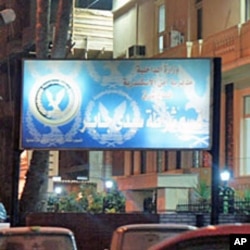Even as a dispute about government repression of the electoral process roils Alexandria, many in Egypt's second largest city are also on edge over the death of Ahmed Shaban. The young man's body was discovered earlier this month, several days after an encounter with security. It is the second such death linked to the same local police station in recent months. Those willing to talk about the case show a fear of security even greater than those expressed by the government's political opponents.
Ahmed Shaban's sister, Naglaa, is unwilling to speak on camera, even to have her voice recorded. She had spoken the day before to reporters and human rights groups. Within hours, she said, state security threatened her with reprisal if she kept talking about the case.
A man from the neighborhood, who identifies himself only as Amir, warns of the risks, saying no one here will talk to you. Whoever talks, he says, the government comes and bundles them away.
Even with the reported threats, Naglaa Shaban agrees to meet on a darkened side street not far from where she lives in this working class neighborhood, her lawyer and a friend by her side. She describes the events as best as her family and witnesses have been able to piece together.
Her 19-year-old brother, Ahmed and his friend, Ahmed Farrag Labib, were returning home from a wedding on November 7 when they were stopped by security forces. The young men are believed to have complained over a demand to be searched. Witnesses say police then took them to Sidi Gaber police station.
In the days following, Shaban's relatives went to the police station and other government offices searching for news. Authorities said they had no knowledge of his whereabouts. Then came an anonymous call: Ahmed's phone and jacket were found in a nearby canal. On November 12, police told family members Ahmed's body had been recovered and was at the morgue. Relatives confirmed it was Ahmed, and say his arms and torso were torn open, his fingernails and toenails ripped out.
Police suggested Ahmed committed suicide by jumping in the canal, adding that the wounds were probably self-inflicted. The family says they were not allowed to hold a proper funeral, and that security forces went with them as the body was buried.
While official newspapers largely ignored the story, Egypt's active internet blogosphere quickly picked up on the accounts, making comparisons to the death of Khaled Said, a young man who died in June after an encounter with undercover police, also from Sidi Gabr station.
Witnesses recount how Said was dragged from an Internet cafe and beaten to death outside on the street. Police initially said Said tried to conceal a package of illegal drugs by swallowing them, and choked to death. Gruesome, post-mortem photographs showed injuries, a fractured jaw, broken teeth and a cracked skull, more consistent with a savage beating than accidental suffocation.
To people like Ahmed's neighbor, Amir, such stories are too familiar.
Using a reference to security forces, Amir says "the Eagle" is stronger than us. God is up in the sky, but the Eagle is here on Earth. He adds, may God keep their harm from us.
But recently, public outcry has made a difference in the way security forces have reacted. Initially, the government repeatedly denied that police were involved in Khaled Said's death. But after an online campaign, public protests and calls from international human rights groups, Egyptian officials reopened the case. Two police officers are currently facing trial.
The blogosphere has also been quick to raise questions about the death of Ahmed Shaban. Amnesty International also has demanded a full investigation. Ahmed's sister, Naglaa says her next step is to await the official autopsy report. If it says he died of normal causes, she will demand a special committee from Cairo to exhume her brother's body.
While the answers to those questions await, there is another, unresolved aspect to the case - the fate of Ahmed Farrag Labib. Police confirm that Labib, Ahmed's companion the evening of his disappearance, and most likely the key witness in the case, is in their custody on an unrelated charge. But all requests by family, friends, lawyers and human rights groups to have any contact with young man, have so far been denied.













